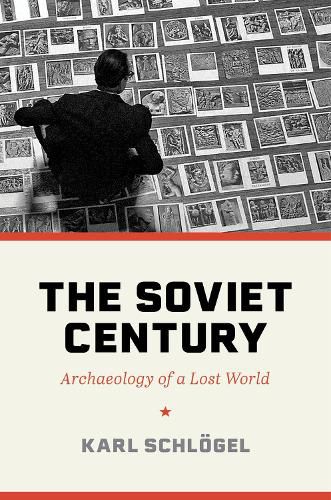Readings Newsletter
Become a Readings Member to make your shopping experience even easier.
Sign in or sign up for free!
You’re not far away from qualifying for FREE standard shipping within Australia
You’ve qualified for FREE standard shipping within Australia
The cart is loading…






The Soviet Union is gone, but its ghostly traces remain, not least in the material vestiges left behind in its turbulent wake. What was it really like to live in the USSR? What did it look, feel, smell, and sound like? In The Soviet Century, Karl Schlgel, one of the world's leading historians of the Soviet Union, presents a spellbinding epic that brings to life the everyday world of a unique lost civilisation.
A museum of and travel guide to the Soviet past, The Soviet Century explores in evocative detail both the largest and smallest aspects of life in the USSR, from the Gulag, the planned economy, the railway system, and the steel city of Magnitogorsk to cookbooks, military medals, prison camp tattoos, and the ubiquitous perfume Red Moscow. The book examines iconic aspects of Soviet life, including long queues outside shops, cramped communal apartments, parades, and the Lenin mausoleum, as well as less famous but important parts of the USSR, including the Great Soviet Encyclopedia, the voice of Radio Moscow, graffiti, and even the typical toilet, which became a pervasive social and cultural topic. Throughout, the book shows how Soviet life simultaneously combined utopian fantasies, humdrum routine, and a pervasive terror symbolised by the Lubyanka, then as now the headquarters of the secret police.
Drawing on Schlgel's decades of travel in the Soviet and post-Soviet world, and featuring more than eighty illustrations, The Soviet Century is vivid, immediate, and grounded in firsthand encounters with the places and objects it describes. The result is an unforgettable account of the Soviet Century.
'An impressively evocative look at material life in the USSR, from gulags and the planned economy to Red Moscow perfume and the Soviet toilet a "lost civilisation" of utopian fantasy and unbridled terror.' Financial Times
$9.00 standard shipping within Australia
FREE standard shipping within Australia for orders over $100.00
Express & International shipping calculated at checkout
The Soviet Union is gone, but its ghostly traces remain, not least in the material vestiges left behind in its turbulent wake. What was it really like to live in the USSR? What did it look, feel, smell, and sound like? In The Soviet Century, Karl Schlgel, one of the world's leading historians of the Soviet Union, presents a spellbinding epic that brings to life the everyday world of a unique lost civilisation.
A museum of and travel guide to the Soviet past, The Soviet Century explores in evocative detail both the largest and smallest aspects of life in the USSR, from the Gulag, the planned economy, the railway system, and the steel city of Magnitogorsk to cookbooks, military medals, prison camp tattoos, and the ubiquitous perfume Red Moscow. The book examines iconic aspects of Soviet life, including long queues outside shops, cramped communal apartments, parades, and the Lenin mausoleum, as well as less famous but important parts of the USSR, including the Great Soviet Encyclopedia, the voice of Radio Moscow, graffiti, and even the typical toilet, which became a pervasive social and cultural topic. Throughout, the book shows how Soviet life simultaneously combined utopian fantasies, humdrum routine, and a pervasive terror symbolised by the Lubyanka, then as now the headquarters of the secret police.
Drawing on Schlgel's decades of travel in the Soviet and post-Soviet world, and featuring more than eighty illustrations, The Soviet Century is vivid, immediate, and grounded in firsthand encounters with the places and objects it describes. The result is an unforgettable account of the Soviet Century.
'An impressively evocative look at material life in the USSR, from gulags and the planned economy to Red Moscow perfume and the Soviet toilet a "lost civilisation" of utopian fantasy and unbridled terror.' Financial Times